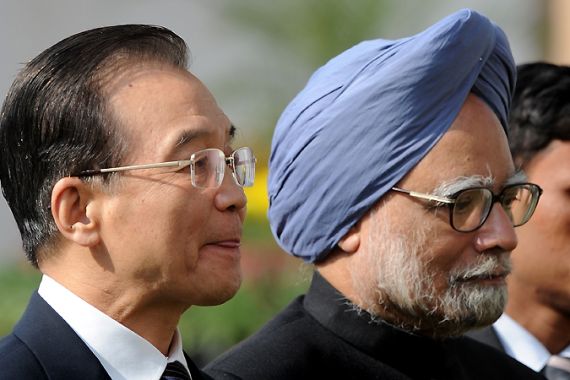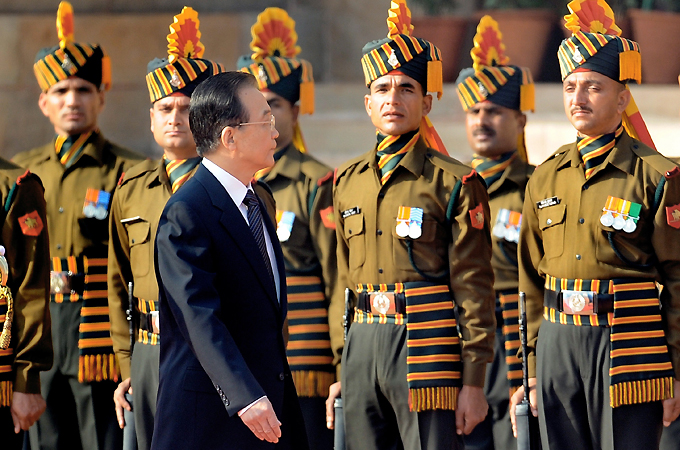Wen on charm offensive in India
Leaders of China and India set to strengthen trade and security ties in bilateral talks, despite deep differences.

 |
| Wen’s carefully choreographed visit is the first by a Chinese premier to India in five years [AFP] |
Wen Jiabao, the Chinese premier, has continued his charm offensive in India, offering support for New Delhi’s bid for a greater role in the United Nations and agreeing on an ambitious target of $100bn in trade between the rising Asian powers by 2015.
Wen and Manmohan Singh, the prime minister of India, exchanged vows of amity and goodwill on Thursday. They appeared to put aside a series of differences that have long hampered relations between the two countries, ahead of brief bilateral talks in the capital.
Relations between the Asian giants are tense, despite the booming trade relationship between them. Nearly 40 years after they fought a war, there are still rifts over disputed borders. Suspicion remains high in New Delhi over China’s regional ambitions and its close ties with India’s arch-rival, Pakistan.
Yet Wen’s visit, the first by a Chinese premier to India in five years, appears to have been carefully choreographed to improve ties.
“I believe with our joint efforts, through the visit, we’ll be able to raise our friendship and co-operation to a high level in the new century,” Wen declared on Thursday, standing alongside Singh at the Indian presidential palace after a formal welcome ceremony.
‘Not rivals’
Arriving with more than 300 business leaders the previous day, Wen said that India and China were not rivals and there was enough room in the world for both powers to develop.
“With the joint efforts of the prime minister and I, we’ll be able to reach [an] important strategic consensus during my visit and the visit will yield important outcomes,” he said.
Singh responded in kind to Wen’s effusive words before they went into a meeting behind closed doors.
“A strong partnership between India and China will contribute to long-term, peace, stability, prosperity and development in Asia and the world,” he said.
The two leaders said they were aiming to raise bilateral trade to $100bn by 2015 from $60bn in 2001, an increase which would be driven in part by greater access for Indian firms to Chinese markets.
“The two sides agreed to take measure to promote greater Indian exports to China with a view to reduce India’s trade deficit,” a joint statement said.
Extensive trade
China is now India’s largest trade partner and two-way trade is expected to reach $60bn in 2010/11. Trade was $13.6bn in 2004/05 and $3bn in 2001/02 – illustrating a phenomenal growth rate.
While the two are often lumped together as emerging world powers, China’s GDP is four times bigger than India’s and its infrastructure outshines India’s dilapidated roads and ports, a factor that makes New Delhi wary of Beijing’s growing might.
The joint statement outlined Beijing’s support for United Nations Security Council Resolution 1267, which calls for sanctions against the Lakshar-e-Taiba armed group that New Delhi blames for the 2008 attacks in Mumbai.
India fears China may oppose its bid for a permanent UN Security Council seat, so as to restrict its global reach.
China, however, reiterated its support for India’s aspirations to play a greater role in the Security Council, though it stopped short of expressing full backing for India.
Beijing’s overtures toward New Delhi come just a little over a month after a trip to India by Barack Obama, the US president. During his visit, he endorsed India’s long-held demand for a permanent seat.